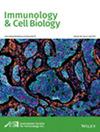ILC1是自身免疫性肾损伤的关键看门人。
IF 3.2
4区 医学
Q3 CELL BIOLOGY
引用次数: 0
摘要
最近的一篇文章表明,阻断NKp46信号可以减少损伤,强调这些细胞是自身免疫性疾病中器官损伤的关键驱动因素和潜在的治疗靶点。在狼疮性肾炎中,NKp46+ ILC1s通过产生CSF2来协调肾脏炎症,驱动促炎巨噬细胞的扩张,浸润上皮龛并加剧组织损伤。本文章由计算机程序翻译,如有差异,请以英文原文为准。

ILC1 as critical gatekeepers in autoimmune kidney damage
A recent article has shown that blocking NKp46 signaling reduces injury, highlighting these cells as key drivers of organ damage and potential therapeutic targets in autoimmune diseases. In lupus nephritis, NKp46+ ILC1s orchestrate kidney inflammation by producing CSF2, driving the expansion of pro-inflammatory macrophages that infiltrate epithelial niches and exacerbate tissue damage.
求助全文
通过发布文献求助,成功后即可免费获取论文全文。
去求助
来源期刊

Immunology & Cell Biology
医学-免疫学
CiteScore
7.50
自引率
2.50%
发文量
98
审稿时长
4-8 weeks
期刊介绍:
The Australasian Society for Immunology Incorporated (ASI) was created by the amalgamation in 1991 of the Australian Society for Immunology, formed in 1970, and the New Zealand Society for Immunology, formed in 1975. The aim of the Society is to encourage and support the discipline of immunology in the Australasian region. It is a broadly based Society, embracing clinical and experimental, cellular and molecular immunology in humans and animals. The Society provides a network for the exchange of information and for collaboration within Australia, New Zealand and overseas. ASI members have been prominent in advancing biological and medical research worldwide. We seek to encourage the study of immunology in Australia and New Zealand and are active in introducing young scientists to the discipline.
 求助内容:
求助内容: 应助结果提醒方式:
应助结果提醒方式:


